AMD Ryzen 3 1300X Review
Why you can trust Tom's Hardware
VRMark, 3DMark & AotS: Escalation
VRMark & 3DMark
We aren't big fans of using synthetic benchmarks to measure game performance, but 3DMark's DX11 and DX12 CPU tests provide useful insight into the amount of horsepower available to game engines.
Futuremark's VRMark test lets you gauge your system's suitability for use with the HTC Vive or Oculus Rift, even if you don't currently own an HMD. The Orange Room test is based on the suggested system requirements for current-generation HTC Vive and Oculus Rift HMDs. Futuremark defines a passing score as anything above 109 FPS.
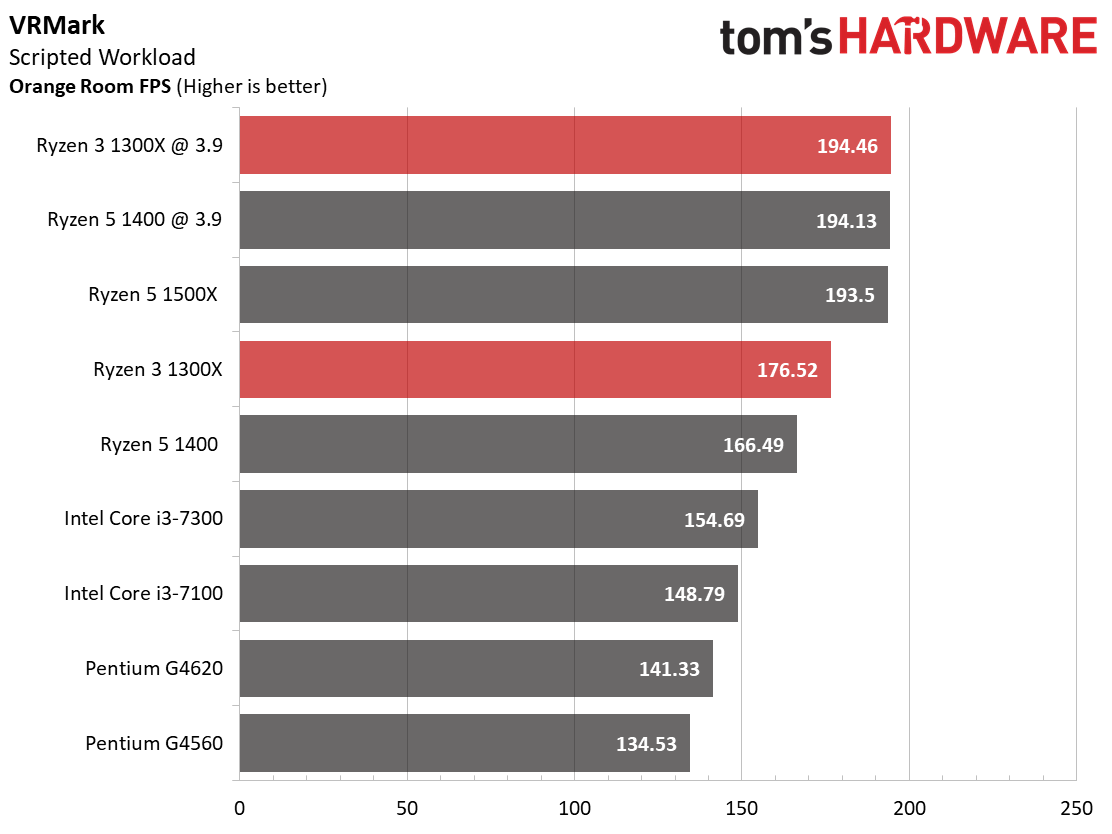
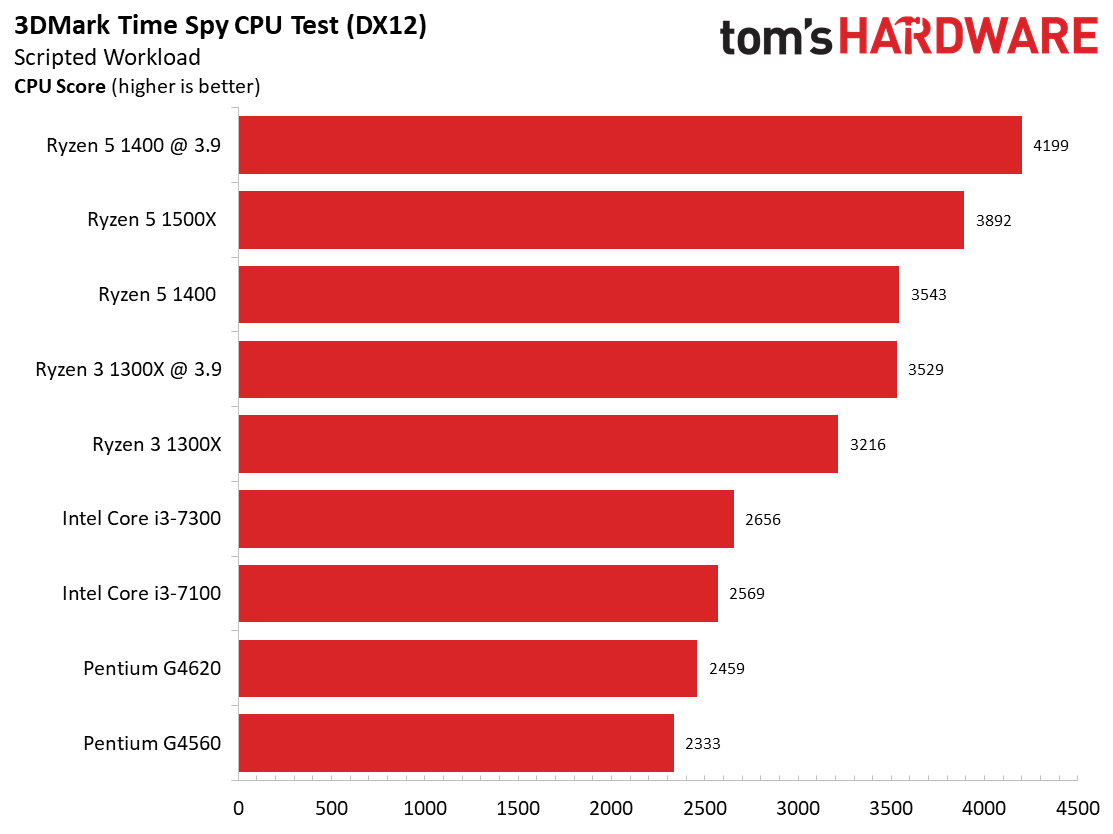
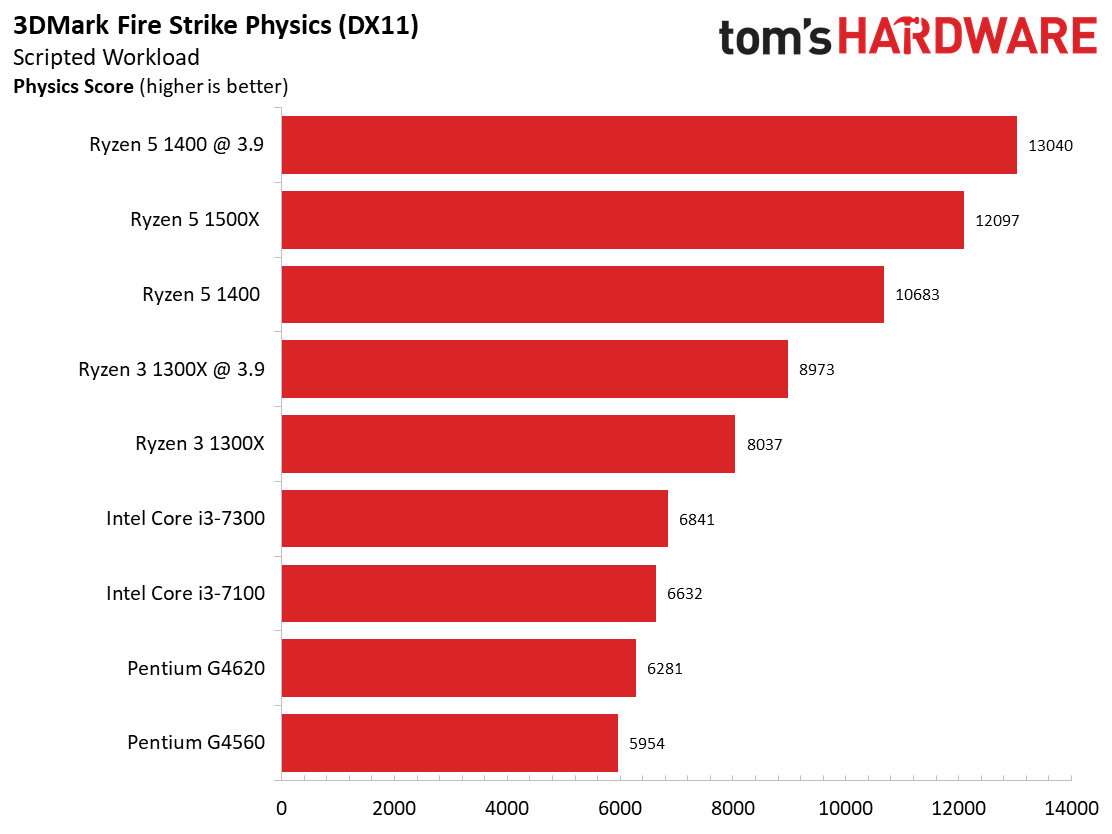
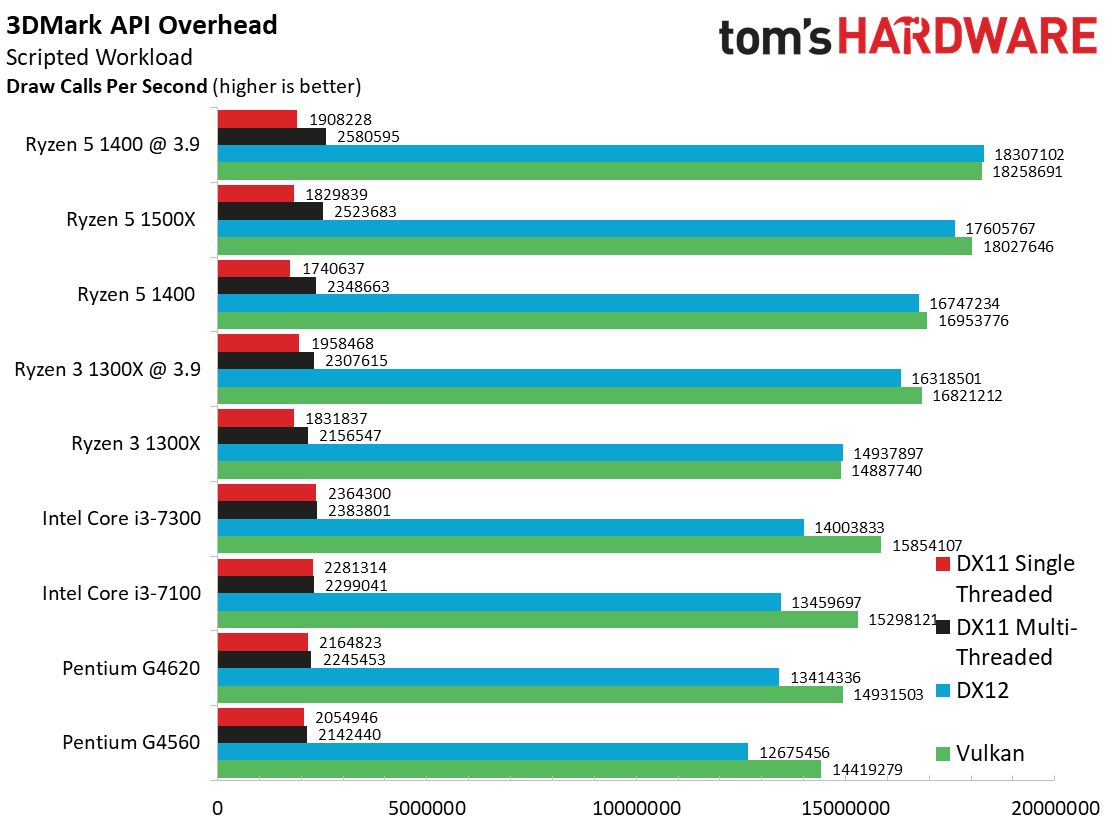
AMD lists Ryzen 3 and its Ryzen 5 1400 as "VR Ready," while the higher-end Ryzen models are considered "VR Ready Premium." In VRMark at stock settings, we see the distance between the premium Ryzen 5 1500X and AMD's other CPUs. Frequency adjustments allow Ryzen 3 1300X to overtake the other contenders, including AMD's more expensive Ryzen 5 1400. And as we expected, Ryzen dominates its Intel competition.
We also see the benefit of AMD's core count advantage; Ryzen manhandles the Core i3 and Pentium processors in our threaded physics, CPU, and API tests. Meanwhile, the DX11-based single-threaded API metric favors Intel by a convincing margin due to its architecture's superior IPC throughput and higher clock rates.
Ashes of the Singularity: Escalation
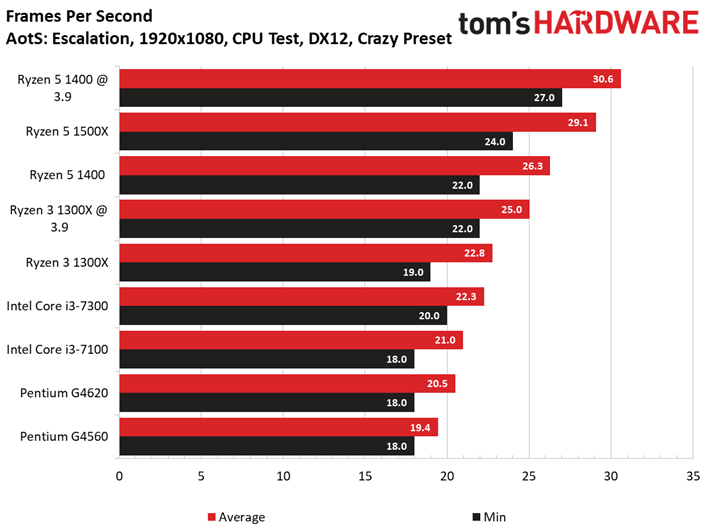
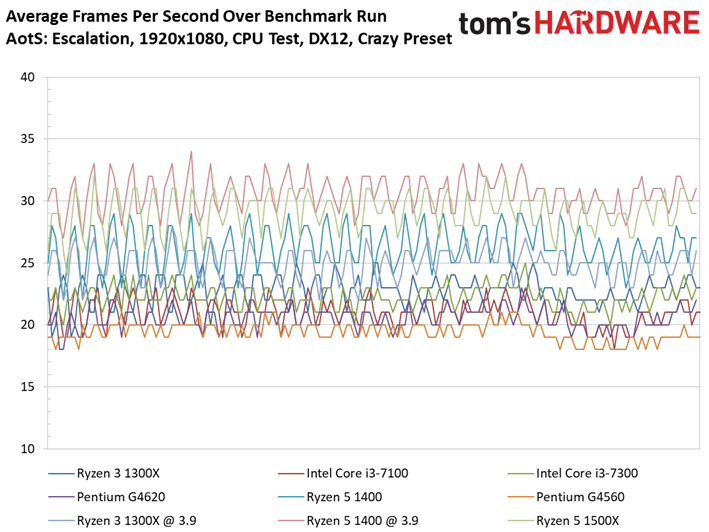
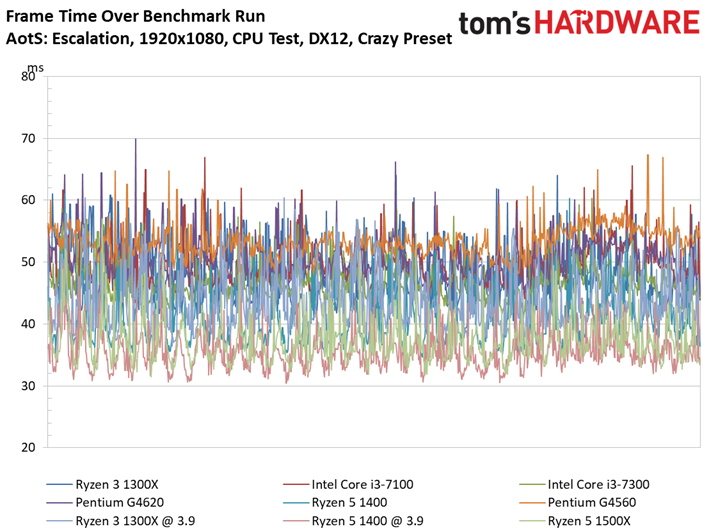
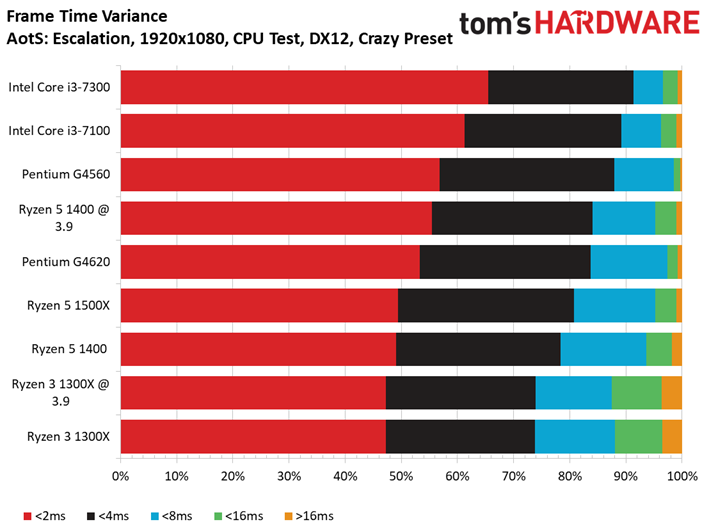
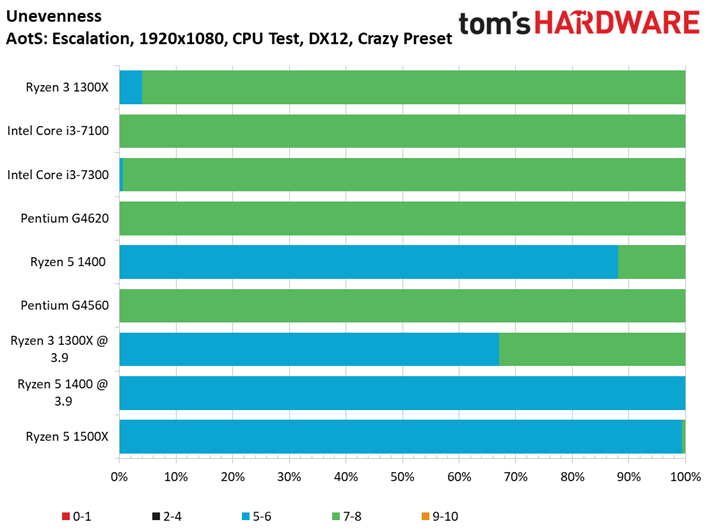
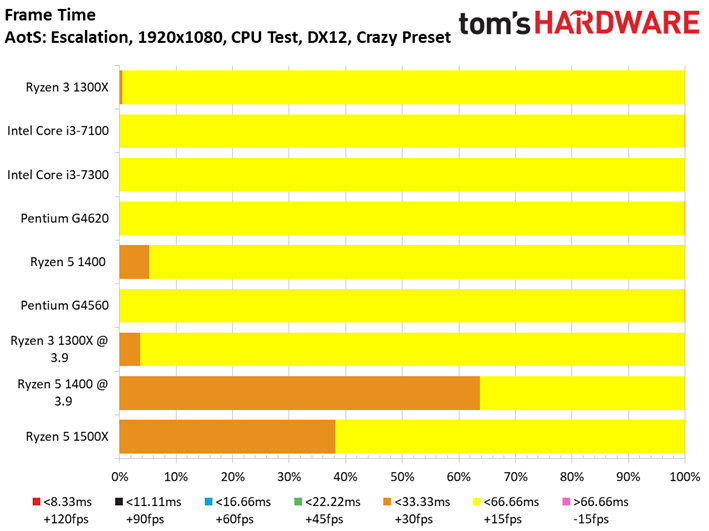
Ashes of the Singularity: Escalation is a computationally intense title. Even beefy 10-core processors can't push past 60 FPS in the game's CPU benchmark, so it's not surprising to see overclocked budget-friendly chips struggling to hit 30 FPS.
Even still, this game rewards AMD with a convincing win against Intel. Stock Ryzens fall into a predictable hierarchy based on core count and SMT capabilities. To that end, the quad-core Ryzen 5 1400 beats the 1300X thanks to enabled SMT functionality.
MORE: Best CPUs
Get Tom's Hardware's best news and in-depth reviews, straight to your inbox.
MORE: Intel & AMD Processor Hierarchy
MORE: All CPUs Content
Current page: VRMark, 3DMark & AotS: Escalation
Prev Page Test Setup Next Page Civilization VI, Battlefield 1 & Dawn of War III
Paul Alcorn is the Editor-in-Chief for Tom's Hardware US. He also writes news and reviews on CPUs, storage, and enterprise hardware.
-
yankeeDDL Wow.Reply
I don't remember when it was last time when we saw a review where, practically, in every chart AMD was at the top, and Intel at the bottom. It is refreshing really. Hopefully this will drive Intel to cleanup the mess it created in 5+ years of unchallenged leadership, and get its acts in order.
I'm enjoying the moment though. With my Ryzen 5 1600 :) -
blackmagnum This is the product segment my slim wallet has been waiting for. I just hope that Intel will fight back with a price war. Now bring in the Ryzen+IGP for office gaming!Reply -
SS_1__ The only mainstream chips Intel makes worth buying are the G4560 and 7700k, AMD has the rest of the product stack.Reply -
mjslakeridge The thing I found interesting from the review is that the disabled cores still receive power (second to last page of the review). Now we just need to figure out how to enable the "hidden" cores!Reply -
bloodroses While I wasn't impressed with the Ryzen 5, their 7 and 3 are really putting the hurt on Intel. Good job AMD for getting back into the race. :) Let's hope they can do the same against Nvidia so true competition will finally be back.Reply -
InvalidError Reply
There isn't a whole lot that Intel can do about it other than drop prices for a given amount of cores and threads, though you can expect Intel to hold on to premium pricing for its IPC, clock frequency and lower power advantages.19988753 said:Hopefully this will drive Intel to cleanup the mess it created in 5+ years of unchallenged leadership, and get its acts in order.
What I'm really curious to see for the mainstream/office segment is the Ryzen-Vega APUs. -
madmatt30 Amd are just absolutely smashing it this year.Reply
Which is a great great thing after Intel's dominance & stranglehold for the last 6 years.
Intel price war ??
No that's not going to happen if it hasn't already ,they're way too arrogant to ever do that.
-
redgarl One of the best CPU of the year with the 1600x. I still take my 1700x over them, but if you are under budget, there is no questions.Reply
Too bad their Vega card seems like another Fury. I sold my stock and wait for the first benches before rebuying it. Also, indication is that RX will cost 600-650$ and barely beating a 1080 GTX. However Vega core are going to be incridilbe with AMD APU on the laptop segment. Nvidia MXM cards are going to be a bad investment and cost a fortune while everything will be on the same chip for AMD. -
dudmont If AMD wants to grab business/oem market, they should come out with a very low end graphics card, something that costs 40$(preferably 20$) or less, that they could bundle with these Ryzen 3s and sell as a one stop solution. So long as it performed similarly to intels IGPs, and the price was competitive, their performance advantage would give them a shot at stealing sales. For them to really get market share, which is where these Ryzen 3s sit, they need to be able to offer something to more than just gamers on a budget.Reply